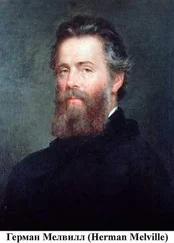Southwest from our tower lies all Polynesia, hundreds of leagues away; but straight west, on the precise line of his parallel, no land rises till your keel is beached upon the Kingsmills, a nice little sail of, say 5000 miles.
Having thus by such distant references—with Rodondo the only possible ones—settled our relative place on the sea, let us consider objects not quite so remote. Behold the grim and charred Enchanted Isles. This nearest crater–shaped headland is part of Albemarle, the largest of the group, being some sixty miles or more long, and fifteen broad. Did you ever lay eye on the real genuine Equator? Have you ever, in the largest sense, toed the Line? Well, that identical crater–shaped headland there, all yellow lava, is cut by the Equator exactly as a knife cuts straight through the centre of a pumpkin pie. If you could only see so far, just to one side of that same headland, across yon low dikey ground, you would catch sight of the isle of Narborough, the loftiest land of the cluster; no soil whatever; one seamed clinker from top to bottom; abounding in black caves like smithies; its metallic shore ringing under foot like plates of iron; its central volcanoes standing grouped like a gigantic chimney–stack.
Narborough and Albemarle are neighbors after a quite curious fashion. A familiar diagram will illustrate this strange neighborhood:
Cut a channel at the above letter joint, and the middle transverse limb is Narborough, and all the rest is Albemarle. Volcanic Narborough lies in the black jaws of Albemarle like a wolf's red tongue in his open month.
If now you desire the population of Albemarle, I will give you, in round numbers, the statistics, according to the most reliable estimates made upon the spot:
Men, none. Ant–eaters, unknown. Man–haters, unknown. Lizards, 500,000. Snakes, 500,000. Spiders, 10,000,000. Salamanders, unknown. Devils, do. Making a clean total of 11,000,000,
exclusive of an incomputable host of fiends, ant–eaters, man–haters, and salamanders.
Albemarle opens his mouth towards the setting sun. His distended jaws form a great bay, which Narborough, his tongue, divides into halves, one whereof is called Weather Bay, the other Lee Bay; while the volcanic promontories, terminating his coasts, are styled South Head and North Head. I note this, because these bays are famous in the annals of the Sperm Whale Fishery. The whales come here at certain seasons to calve. When ships first cruised hereabouts, I am told, they used to blockade the entrance of Lee Bay, when their boats going round by Weather Bay, passed through Narborough channel, and so had the Leviathans very neatly in a pen.
The day after we took fish at the base of this Round Tower, we had a fine wind, and shooting round the north headland, suddenly descried a fleet of full thirty sail, all beating to windward like a squadron in line. A brave sight as ever man saw. A most harmonious concord of rushing keels. Their thirty kelsons hummed like thirty harp–strings, and looked as straight whilst they left their parallel traces on the sea. But there proved too many hunters for the game. The fleet broke up, and went their separate ways out of sight, leaving my own ship and two trim gentlemen of London. These last, finding no luck either, likewise vanished; and Lee Bay, with all its appurtenances, and without a rival, devolved to us.
The way of cruising here is this. You keep hovering about the entrance of the bay, in one beat and out the next. But at times—not always, as in other parts of the group—a racehorse of a current sweeps right across its mouth. So, with all sails set, you carefully ply your tacks. How often, standing at the foremast head at sunrise, with our patient prow pointed in between these isles, did I gaze upon that land, not of cakes, but of clinkers, not of streams of sparkling water, but arrested torrents of tormented lava.
As the ship runs in from the open sea, Narborough presents its side in one dark craggy mass, soaring up some five or six thousand feet, at which point it hoods itself in heavy clouds, whose lowest level fold is as clearly defined against the rocks as the snow–line against the Andes. There is dire mischief going on in that upper dark. There toil the demons of fire, who, at intervals, irradiate the nights with a strange spectral illumination for miles and miles around, but unaccompanied by any further demonstration; or else, suddenly announce themselves by terrific concussions, and the full drama of a volcanic eruption. The blacker that cloud by day, the more may you look for light by night. Often whalemen have found themselves cruising nigh that burning mountain when all aglow with a ball–room blaze. Or, rather, glass–works, you may call this same vitreous isle of Narborough, with its tall chimney–stacks.
Where we still stand, here on Rodondo, we cannot see all the other isles, but it is a good place from which to point out where they lie. Yonder, though, to the E.N.E., I mark a distant dusky ridge. It is Abington Isle, one of the most northerly of the group; so solitary, remote, and blank, it looks like No–Man's Land seen off our northern shore. I doubt whether two human beings ever touched upon that spot. So far as yon Abington Isle is concerned, Adam and his billions of posterity remain uncreated.
Ranging south of Abington, and quite out of sight behind the long spine of Albemarle, lies James's Isle, so called by the early Buccaneers after the luckless Stuart, Duke of York. Observe here, by the way, that, excepting the isles particularized in comparatively recent times, and which mostly received the names of famous Admirals, the Encantadas were first christened by the Spaniards; but these Spanish names were generally effaced on English charts by the subsequent christenings of the Buccaneers, who, in the middle of the seventeenth century, called them after English noblemen and kings. Of these loyal freebooters and the things which associate their name with the Encantadas, we shall hear anon. Nay, for one little item, immediately; for between James's Isle and Albemarle, lies a fantastic islet, strangely known as "Cowley's Enchanted Isle." But, as all the group is deemed enchanted, the reason must be given for the spell within a spell involved by this particular designation. The name was bestowed by that excellent Buccaneer himself, on his first visit here. Speaking in his published voyages of this spot, he says—"My fancy led me to call it Cowley's Enchanted Isle, for, we having had a sight of it upon several points of the compass, it appeared always in so many different forms; sometimes like a ruined fortification; upon another point like a great city," etc. No wonder though, that among the Encantadas all sorts of ocular deceptions and mirages should be met.
That Cowley linked his name with this self–transforming and bemocking isle, suggests the possibility that it conveyed to him some meditative image of himself. At least, as is not impossible, if he were any relative of the mildly–thoughtful and self–upbraiding poet Cowley, who lived about his time, the conceit might seem unwarranted; for that sort of thing evinced in the naming of this isle runs in the blood, and may be seen in pirates as in poets.
Still south of James's Isle lie Jervis Isle, Duncan Isle, Grossman's Isle, Brattle Isle, Wood's Isle, Chatham Isle, and various lesser isles, for the most part an archipelago of aridities, without inhabitant, history, or hope of either in all time to come. But not far from these are rather notable isles—Barrington, Charles's, Norfolk, and Hood's. Succeeding chapters will reveal some ground for their notability.
Sketch Fifth.
The Frigate, and Ship Flyaway.
"Looking far forth into the ocean wide,
A goodly ship with banners bravely dight,
And flag in her top–gallant I espide,
Through the main sea making her merry flight."
Читать дальше








